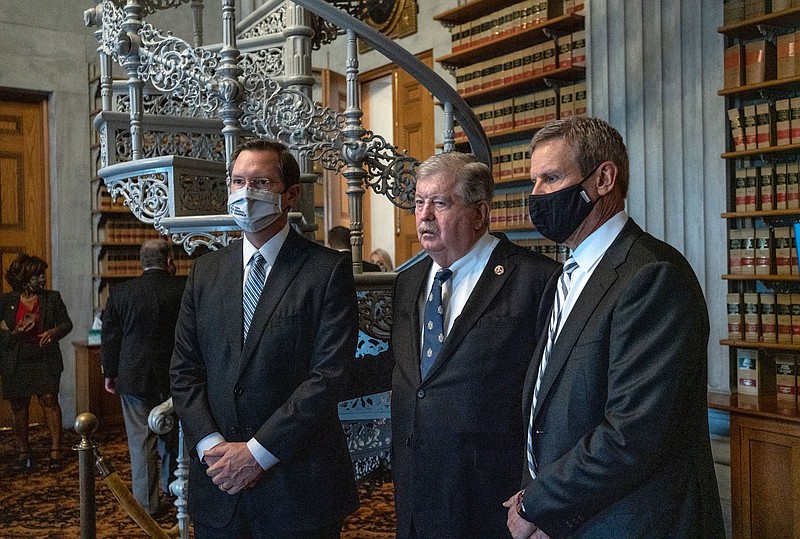Tennessee Gov. Bill Lee has shrugged off the idea of a special session to deal with billions of dollars in federal funding, but some key lawmakers say legislators might need to be called back to Nashville late his summer to handle the overflow of money.
The state is to receive $8.6 billion in federal funds, with $4 billion going to state coffers, $3.82 billion of which is targeted for the fiscal recovery fund and $216 million for coronavirus capital projects, according to reports.
Another $2.27 billion is to go straight to county and city governments, and $2.3 billion is set for local school districts. School districts also have about $2.7 billion more coming from previous allotments.
Legislators adjourned the first year of the 112th General Assembly on May 5. But talk circulated for weeks about whether lawmakers would need to return to approve the spending of those federal funds and make other adjustments.
Senate Finance, Ways and Means Committee Chairman Sen. Bo Watson, R-Hixson, said this week it's unclear whether the legislature can avoid a special session because of the sheer amount of money headed for Tennessee. The fiscal 2021-22 budget year starts July 1.
Under the state's budget expansion request process, agencies seek approval for budget adjustments to account for extra money, and House and Senate finance chairs poll their members to see whether they approve of the adjustments or want to hold hearings before the chairs sign off on the money.
"We are going to try and run our normal expansion request process with these new federal dollars that are coming in unless it's just so burdensome we just can't manage it. We don't know yet," Watson said.
Not only the large amount of money involved but the number of expansion requests and the potential for reallocation of local funds could lead to the need for lawmakers to return to Nashville, Watson said.
For instance, the governor put $100 million in the state's $42.6 billion spending plan for broadband expansion. But the federal funding could bring in another $100 million for running broadband to underserved areas, and lawmakers will have to decide whether they want to take that state money back early or wait until January, Watson said.
Likewise, the money going straight to school districts and local governments could "supplant" funds the legislature approved for school and city and county governments and lawmakers might need to determine how much to put back in the state budget, according to Watson.
"I would say if the feds are supplanting state dollars, then the state should at least look at whether we can reallocate those dollars for some other purposes," Watson said.
A special session, which would likely cost the state around $50,000 for one day, appears unlikely, though.
A spokesman for Lt. Gov. Randy McNally, R-Oak Ridge, confirmed lawmakers talked previously about the possibility of asking the governor to convene the General Assembly but now hope to avoid one.
"While there have been discussions and it is always an option, a special session may not be needed. Lt. Gov. McNally is hopeful the expansion request process through the finance committees as well as the bipartisan Fiscal Accountability Group will make a budget-focused special session unnecessary," McNally spokesman Adam Kleinheider said in a statement.
House Speaker Cameron Sexton said no discussions are being held related to a special session.
And Lee, when asked about the need for an extraordinary session, said bipartisan members on his financial stimulus accountability group should be able to stave off the need for a gathering this summer.
The Senate and House speakers, Finance chairs, other Democrats and Republicans, the Finance and Administration commissioner and Comptroller serve on the panel. The group will work on determining how the money should be spent to "provide transparency" and input from Tennesseans, Lee said.
The Tennessee Journal reported in April the addition of Senate Speaker Pro Tem Ferrell Haile of Gallatin and House Finance Chair Patsy Hazlewood of Signal Mountain to the group was seen as a way to forestall a special session.
Yet House Democratic Caucus Chairman Vincent Dixie said he believes that "serious discussions" are underway, at least preliminarily, to hold a special session. He has a different outlook than Republican leaders on how any special session to deal with federal money should be used.
"I don't mind having a special session, but I don't want it to be like this budget process was where Democrats had no input. There was no meaningful conversation between any of the Democrats or Republicans throughout this whole process," Dixie said.
Dixie and other Democratic leaders contended they were kept on the sidelines as Republicans who hold a supermajority divvied up funds within the budget before a final vote. House Speaker Sexton balked at that notion, saying leading Democrats were given budget details as soon as they were available.
Read more at TennesseeLookout.com.
